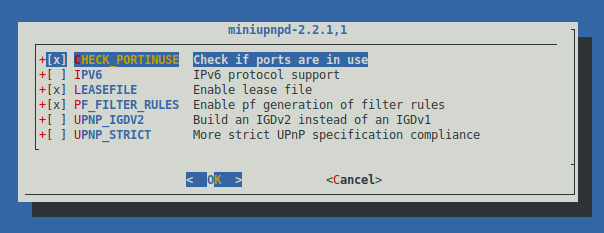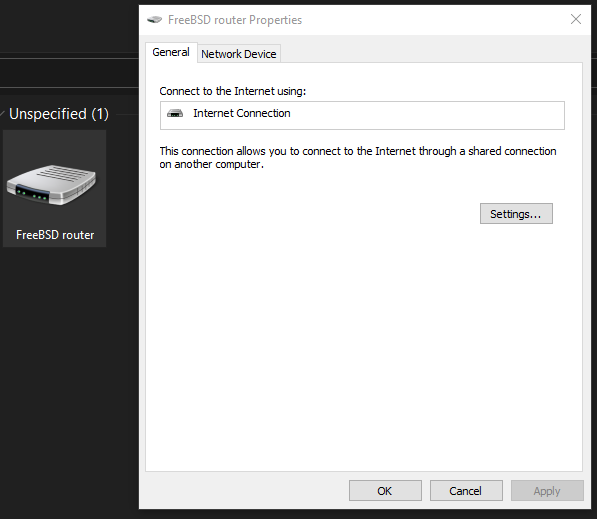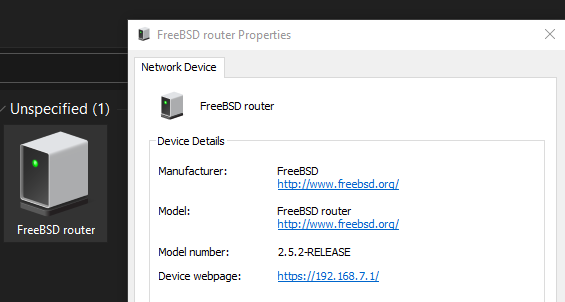pfSense compile requirements for 3rd party software
-
@bmeeks
It all makes much more sense now, thanks!I have a diff file now, and placed it in the ./net/miniupnpd/files folder, then ran a make from ./net/miniupnpd
The output did not show the patch getting applied, should it?
===> Applying FreeBSD patches for miniupnpd-2.2.1_1,1 from /usr/home/admin/git/FreeBSD-ports/net/miniupnpd/files /usr/bin/sed -i.bak -e 's|\(-lssl -lcrypto\)|$(LDFLAGS) \1|g' /usr/home/admin/git/FreeBSD-ports/net/miniupnpd/work/miniupnpd-2.2.1/Makefile.bsdThe one line of output isn't mine.
-
@encrypt1d said in pfSense compile requirements for 3rd party software:
@bmeeks
It all makes much more sense now, thanks!I have a diff file now, and placed it in the ./net/miniupnpd/files folder, then ran a make from ./net/miniupnpd
The output did not show the patch getting applied, should it?
===> Applying FreeBSD patches for miniupnpd-2.2.1_1,1 from /usr/home/admin/git/FreeBSD-ports/net/miniupnpd/files /usr/bin/sed -i.bak -e 's|\(-lssl -lcrypto\)|$(LDFLAGS) \1|g' /usr/home/admin/git/FreeBSD-ports/net/miniupnpd/work/miniupnpd-2.2.1/Makefile.bsdThe one line of output isn't mine.
If it compiled without error when running the
makecommand, it should be fine. If it can't apply a patch due to an error, the console output will show that and compilation will halt if you are doing it interactively by runningmake.So are you saying that line of screen output you posted is not from your run, or is it? That line shows it read the
./files/subdirectory and applied all the patches it found there successfully.If you want to actually see the patches, look in the
./work/subdirectory that gets created in the port's directory when you build it. In the source code folder underworkyou will find all of the modified and original source code files. The original ones get a special extension but the same first name.By the way, between build cycles it is customary to clean the build directory tree under
./workusing this command:make cleanThat insures you are starting fresh each time and not using something from an earlier run. I like to always use clean between build cycles when I'm working on something new in code.
-
@bmeeks
Hmm. I don't think it is picking up my patch - I don't see any evidence of it in ./work/miniupnpd-2.2.1. I was hoping that the output of make would show it picking up my file specifically (positive affirmation). To answer your question, that is the output of my make run, and the line that is there is coming from a post-patch action in the make file itself, and it should be there.This is what my diff looks like. Perhaps it is a relative path issue. Is it using the work directory as the starting point?
diff -ruN ./miniupnpd_port.orig/miniupnpd.c ./miniupnpd_port/miniupnpd.c --- ./miniupnpd.c 2020-10-30 17:38:06.000000000 -0400 +++ ./miniupnpd.c 2022-02-10 11:12:04.026100000 -0500 @@ -2144,6 +2144,7 @@ } syslog(LOG_INFO, "version " MINIUPNPD_VERSION " starting%s%sext if %s BOOTID=%u", + syslog(LOG_INFO, "CUSTOM version " MINIUPNPD_VERSION " starting%s%sext if %s BOOTID=%u", #ifdef ENABLE_NATPMP #ifdef ENABLE_PCP GETFLAG(ENABLENATPMPMASK) ? " NAT-PMP/PCP " : " ",I tried 2 versions, one with all of the leading paths remove as you suggested, and this one where they were still in the diff command itself.
My folder structure looks like this:
./FreeBSD-ports/net/miniupnpd (from port tree - copied patch into files subfolder within, and ran make from here) ./FreeBSD-ports/net/miniupnpd_port.orig (golden copy) ./FreeBSD-ports/net/miniupnpd_port (changed code) -
E encrypt1d referenced this topic on
-
I'm not sure I understand your directory structure. Or perhaps you misunderstood what I meant. I don't think your patch file has the correct directory paths.
You will need the actual source tarball. Where did you obtain the source tarball file? Since you have built the package once already on your FreeBSD box, go look in
/usr/ports/distfilesfor the miniupnpd source tarball. Copy that *.tar.gz file to/tmpto make things easier.I do my modifications in a structure under
/tmp, but you could do it under any directory you created.Now change to the
/tmpdirectory and run this sequence of commands to extract the content of the source tarball into two subdirectories (renaming one of them as an intermediate step):tar -xvzf whatever_src.tar.gz mv whatever_src what_ever_src.orig tar -xvzf whatever_src.tar.gzIn the above, "whatever_src.tar.gz" is the name of the source tarball. When you extract it, it should create a subdirectory in
/tmpand put all the C source files, configure files, and other stuff needed to compile the binary in there.The second command in the sequence above renames the source subdirectory to the same name but appends ".orig" to show it is the reference copy of the port.
Now make your source code changes in the other directory. When finished, run that
diffcommand I provided earlier. Don't forget to go in and fix the relative paths.Now copy the resulting *.diff patch into the
./filessubdirectory of miniupnpd in/usr/ports/net/miniupnpd/files.Run
makeagain in the port subdirectory/usr/ports/net/miniupnpdand see what happens. It should pick up and apply your patch.To illustrate, I frequently build custom binaries for Suricata and Snort for use on pfSense as part of my package maintainer duties. To begin, I obtain the suricata-6.0.4.tar.gz source tarball (for the current binary as of this date). When I unzip that file in my
/tmpdirectory it will create a subdirectory calledsuricata-6.0.4in/tmp-- so the full path is/tmp/suricata-6.0.4/. And in that subdirectory it will create several other nested subdirectories containing all the files needed to build the binary. The C source code files will be in/tmp/suricata-6.0.4/src/. I rename the directory from the first extraction tosuricata-6.0.4.orig, then I extract the tarball contents a second time. I then have two identical subdirectories as follows:/tmp/suricata-6.0.4.orig/and/tmp/suricata-6.0.4/. I make my source code modifications in the/tmp/suricata-6.0.4/srcdirectory where Suricata places the C source files. Your port may do something else with its C source files.Once I have my new or modified C source files ready, I run this command to create a patch file in the top-level of
/tmp:diff -ruN ./suricata-6.0.4.orig/ ./suricata-6.0.4/ > /tmp/my_patch.diffThe file header line for each file modified by the patch will contain this path:
/tmp/suricata-6.0.4/src/some_file. I modify that line to read./src/some_file, because the Suricata tarball puts all the C source code files in a./srcsubdirectory inside the mainsuricata-6.0.4directory. I then copy my patch file to the./filessubdirectory of the Suricata port and runmake.Don't worry about the
workdirectory structure you see left over after building the port. When the build process unpacks the source tarball, it will handle adding any necessary leading directory names. Your patch file just needs to reflect the paths stored within the source tarball. Or in other words, how it looks when you just unzip the tarball in some directory. -
 J jimp referenced this topic on
J jimp referenced this topic on
-
@bmeeks
Just to keep things clean, I used your exact same directory structure.admin@devbox:/tmp $ ls miniupnpd-2.2.1 miniupnpd-2.2.1.orig admin@devbox:/tmp $ diff -ruN ./miniupnpd-2.2.1.orig/ ./miniupnpd-2.2.1/ > /tmp/my_patch.diff admin@devbox:/tmp $ cat /tmp/my_patch.diff diff -ruN ./miniupnpd-2.2.1.orig/miniupnpd.c ./miniupnpd-2.2.1/miniupnpd.c --- ./miniupnpd-2.2.1.orig/miniupnpd.c 2020-10-30 17:38:06.000000000 -0400 +++ ./miniupnpd-2.2.1/miniupnpd.c 2022-02-11 07:46:28.667533000 -0500 @@ -1822,6 +1822,7 @@ #ifdef TOMATO syslog(LOG_NOTICE, "version " MINIUPNPD_VERSION " started"); + syslog(LOG_NOTICE, "CUSTOM version " MINIUPNPD_VERSION " started"); #endif /* TOMATO */ set_startup_time();I then removed the leading paths (miniupnpd has no subfolders in its tarball):
diff -ruN ./miniupnpd.c ./miniupnpd.c --- ./miniupnpd.c 2020-10-30 17:38:06.000000000 -0400 +++ ./miniupnpd.c 2022-02-11 07:46:28.667533000 -0500 @@ -1822,6 +1822,7 @@ #ifdef TOMATO syslog(LOG_NOTICE, "version " MINIUPNPD_VERSION " started"); + syslog(LOG_NOTICE, "CUSTOM version " MINIUPNPD_VERSION " started"); #endif /* TOMATO */ set_startup_time();I then place the my_patch.diff file in file here, along with the ones miniupnpd ships with:
dmin@devbox:~/git/FreeBSD-ports/net/miniupnpd/files $ ls -l total 20 -rw-r--r-- 1 admin admin 527 Feb 10 13:21 miniupnpd.c -rw-r--r-- 1 admin admin 2037 Feb 10 11:02 miniupnpd.conf.sample.in -rw-r--r-- 1 admin admin 558 Feb 10 11:02 miniupnpd.in -rw-r--r-- 1 admin admin 400 Feb 11 07:52 my_patch.diff -rw-r--r-- 1 admin admin 512 Feb 10 11:02 patch-Makefile.bsdI ran make clean, and make.
admin@devbox:~/git/FreeBSD-ports/net/miniupnpd $ make clean admin@devbox:~/git/FreeBSD-ports/net/miniupnpd $ makeThe patch isn't being merged in. I verified that by testing in a VM, and by inspection of the work directory, the source files in there are the originals except for the compiled outputs (date agrees):
-rwxr-xr-x 1 admin wheel - 177016 Feb 11 07:54 work/miniupnpd-2.2.1/miniupnpd* -rw-r--r-- 1 admin admin - 2735 Oct 5 2019 work/miniupnpd-2.2.1/miniupnpd.8 -rw-r--r-- 1 admin admin - 80744 Oct 30 2020 work/miniupnpd-2.2.1/miniupnpd.c -rw-r--r-- 1 admin admin - 6490 Feb 11 07:54 work/miniupnpd-2.2.1/miniupnpd.conf -rw-r--r-- 1 admin admin - 44680 Feb 11 07:54 work/miniupnpd-2.2.1/miniupnpd.oSo its seems the build is ignoring my patch. I have to assume I have done something wrong, but I have no idea what it could be.
-
The easiest thing to do when hacking on ports like this is to use the ports tree features.
If you have a copy of the ports tree from the same branch as pfSense (e.g. clone the copy from the RELENG_2_6_0 branch of the copy of the FreeBSD ports repo on the pfSense github account) you can do something like this:
$ cd ~/devel/pfsense-ports/net/miniupnpd $ make extract $ cd work/miniupnpd<whatever version it is> <copy original file to `<name>.orig`> <edit file> <repeat for each file> $ make makepatch $ make clean $ make packagemakepatchwill automatically do the diff and such and create properly formatted patch files. No need to do any of that by hand.Also by default the pfSense make.conf for ports sets
PF_FILTER_RULES IPV6 CHECK_PORTINUSEfor the options. -
@jimp said in pfSense compile requirements for 3rd party software:
The easiest thing to do when hacking on ports like this is to use the ports tree features.
If you have a copy of the ports tree from the same branch as pfSense (e.g. clone the copy from the RELENG_2_6_0 branch of the copy of the FreeBSD ports repo on the pfSense github account) you can do something like this:
$ cd ~/devel/pfsense-ports/net/miniupnpd $ make extract $ cd work/miniupnpd<whatever version it is> <edit files> $ make makepatch $ make clean $ make packagemakepatchwill automatically do the diff and such and create properly formatted patch files. No need to do any of that by hand.Also by default the pfSense make.conf for ports sets
PF_FILTER_RULES IPV6 CHECK_PORTINUSEfor the options.Thanks @jimp! I did not know about those extra
makecommands. Where are these commands currently documented for 'make`? This will greatly simplify my work when updating the Suricata and Snort binaries. -
@bmeeks said in pfSense compile requirements for 3rd party software:
Thanks @jimp! I did not know about those extra make commands. Where are these commands currently documented for 'make`? This will greatly simplify my work when updating the Suricata and Snort binaries.
I forgot a step in there but I added it in. Those are documented in the FreeBSD ports handbook IIRC or you can always look in
Mk/bsd.port.mkin the ports repo (or any of the files in that part of the structure) to see what other useful make targets and features there are. -
@jimp @bmeeks
That did the trick! I can see my new log message when the service starts now. I was able to install and back out my patch in my VM successfully using the package manager.Sadly I am still seeing this in my builds:
ioctl(dev, DIOCGETRULES, ...): Operation not supported by deviceNote that I am unable to build against the exact same target as my firewall (12.2 stable) - they've removed that download from all of the internet as far as I can tell. I will try 12.3 Stable next, as that is the next closest.
-
Thanks to you both @jimp and @bmeeks.
Switching to the 12.3 stable worked well, and I also I set my repo to the v2.5.2 label to be safe.
I can patch, compile, install and run custom code now without errors.
Now on to the actual work ... lol.
Much appreciated.
-
I do have one final question - the first time I ran make, this nice little dialog box pops up in the shell:

If I needed to - how can I re-invoke it? It only comes up on the first make, and then never again.
-
@encrypt1d said in pfSense compile requirements for 3rd party software:
If I needed to - how can I re-invoke it? It only comes up on the first make, and then never again
make config -
@jimp
I like the easy answers :) -
Well it seems I spoke too soon.
Any version I build still seems to have the same issue, I thought I had it fixed, but I was wrong.
Even just building what is natively in the port tree (no patches) does not work for me. Still the same errors from IOCTL.
No idea how to fix this, and open to ideas. its slightly inconsistent as well, some builds have far more of these errors than others, with really no changes.
ioctl(dev, DIOCGETRULES, ...): Operation not supported by device ioctl(dev, DIOCCHANGERULE, ...) PF_CHANGE_GET_TICKET: Operation not supported by deviceSeems like @jimp worked on something like this a LONG time ago here: https://redmine.pfsense.org/issues/2527
-
There are some recent changes in pf ioctls but it should be in our tree. Usually that kind of thing would happen if the pf sources in your src tree don't match the pf sources in the tree used to build pfSense.
You may need to make sure you have a copy of the FreeBSD src repo from the pfSense github in
/usr/srcand make sure it's on theRELENG_2_6_0branch. -
@jimp
Since I am testing on 2.5.2 on my firewall, would I not want RELENG_2_5_2? -
Then you'd want to be using the RELENG_2_5_2 branch of the src and ports trees.
-
I started fresh, (Build VM is FreeBSD 12.3 Stable Feb 10) and cloned the FreeBSD source as follows:
git clone -b RELENG_2_5_2 --single-branch https://github.com/pfsense/FreeBSD-srcI moved the contents of the ./FreeBSD-src/ that command downloaded into /usr/src, so that the FreeBSD-src folder isn't in the path anymore.
I then cloned the Ports as follows in my home dir.
git clone -b RELENG_2_5_2 --single-branch https://github.com/pfsense/FreeBSD-portsThe target test firewall is pfSense 2.5.2 RELEASE. Build is clean.
The IOCTL errors still happen, and the application is partially functional, but my game clients don't even try to talk to it. For now, I am not changing or patching anything, just building what comes right out of the port tree for this branch. Is there a checklist somewhere for setting up an environment? I must have missed something.
Could it be the kernel version difference?
Installing miniupnpd-2.2.1_1,1... Newer FreeBSD version for package miniupnpd: To ignore this error set IGNORE_OSVERSION=yes - package: 1203505 - running kernel: 1202504 Ignore the mismatch and continue? [y/N]: yP.S. I am hoping this is a consequence of the errors, but the really weird stuff is that the version of miniupnpd that shipped with 2.5.2 looks like this from Windows (It has a settings option from the general tab, which I can manually program ports if I want to).

The version I built straight from the port tree has a different icon, and is missing the general tab, and does not have a way to add ports. Game clients also don't even try. I'll worry about this after I finally fix the IOCTL erros if it is still happening.

-
I continued to work on this over the weekend and found an image of FreeBSD which has a closer kernel version - now at 1202505 which is only 1 off from what pkg reports for pfSense 2.5.2 (1202504). That's the Jan 28 2021 snapshot of 12.2 stable. Still unable to find the ISO for the same build pfSense used. It would be good if you guys hosted that somewhere.
Same issue - ioctl runtime errors. It's also worth noting the binary I get is bigger than the one that comes out of the official pfSense repo:
original binary: -rwxr-xr-x 1 root wheel 155368 Nov 15 11:52 miniupnpd built binary after pkg add: -rwxr-xr-x 1 root wheel 177000 Feb 13 10:23 miniupnpdThat suggests the compile is using different options I suppose.
-
@encrypt1d said in pfSense compile requirements for 3rd party software:
I continued to work on this over the weekend and found an image of FreeBSD which has a closer kernel version - now at 1202505 which is only 1 off from what pkg reports for pfSense 2.5.2 (1202504). That's the Jan 28 2021 snapshot of 12.2 stable. Still unable to find the ISO for the same build pfSense used. It would be good if you guys hosted that somewhere.
Same issue - ioctl runtime errors. It's also worth noting the binary I get is bigger than the one that comes out of the official pfSense repo:
original binary: -rwxr-xr-x 1 root wheel 155368 Nov 15 11:52 miniupnpd built binary after pkg add: -rwxr-xr-x 1 root wheel 177000 Feb 13 10:23 miniupnpdThat suggests the compile is using different options I suppose.
You need to compare the content of the
pfheader files in your source tree on the machine where you are executing the build to the same header files listed here: https://github.com/pfsense/FreeBSD-src/tree/RELENG_2_5_2.Whether or not you have the exact same kernel is not as critical as having the exact same header files in your build environment. My bet is some of the pf-related header files are different in your build environment as compared to the pfSense 2.5.2 build environment.
You should be able to compile the "stock"
miniupndpdpackage from the pfSense ports repository and install and run it without incident on a pfSense 2.5.2 machine. If that is not working, then it most likely is header files that are your problem. You are not compiling a kernel. You are simply compiling a binary executable and perhas a few dependent libraries.I assume you have actually installed
miniupnpdfrom the SYSTEM > PACKAGE MANAGER screen in pfSense and it works from there. If so, then you should be able to compile the exact same package and have it work. Once you get past that, you can start modifying code. But if you can't get the stock 2.5.2 package to compile and install, then you most likely have header file mismatches.Don't forget to switch to the proper branch in Git when pulling down files to sync in your local repo.